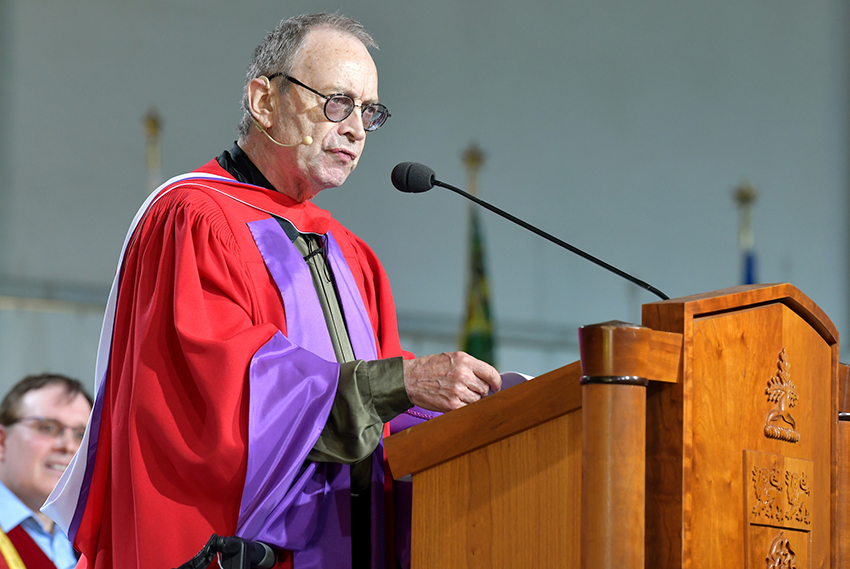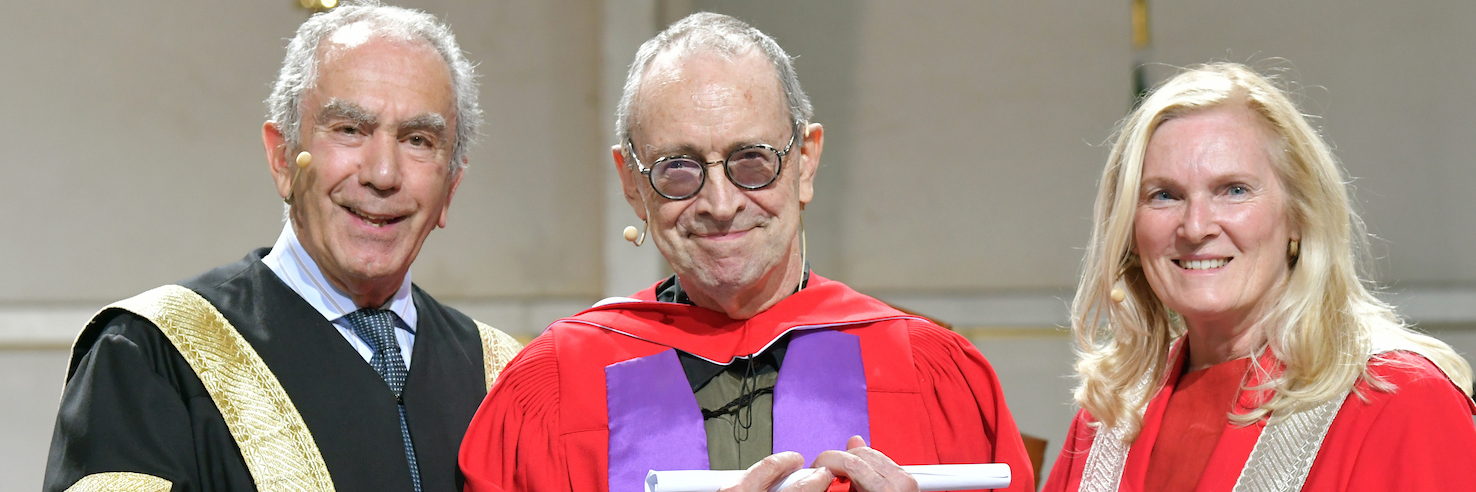By Jenny Pitt-Clark
John Van Burek, renowned theatre producer and translator with some 50 works to his credit, received an honorary degree from York University during Convocation ceremonies for the Glendon Campus that took place June 18.
Van Burek is the founder of Toronto’s Pleiades Theatre and le Théâtre français de Toronto and has taught at universities in Canada, the U.S. and the U.K. He delivered a meaningful address to graduands in both French and English and switched seamlessly between the two languages throughout.
“I don’t know why, or how, I am here, in front of you. I have very few diplomas and I am hardly an academic,” he said, noting that he would, however, take advantage of the opportunity provided to him. The theatre impresario then encouraged the Glendon graduands to be persistent, take chances to “go for it” and put aside their fear of “getting wet.”
«Une des premières choses qu’on apprend dans les arts, d’où je viens, c’est de ne pas dire ˂ non˃ ». [One of the first things you learn in the arts, where I come from, is not to say ‘no.’]»
“You will always be capable. All you have to do is to put yourself on the line,” he said.

He spoke of a past English professor who said that if “ever there is a subject about which you know nothing, but about which you would like to learn, declare yourself a professor of it.” Van Burek said the best way to learn was through curiosity and education: “You all have it in you; someone, i.e. you, only has to go in there and find it.”
He recalled being 30 years old and new to translation, but was urged to take on the challenge by fellow theatre impresario Bill Glassco, who was the founder of Toronto’s renowned Tarragon Theatre. Together they brought the works of Quebec playwright Michel Tremblay to the Tarragon Theatre and introduced them to Canadian audiences through Van Burek’s translations. (Glassco, who died in September 2004, was a Canadian theatre director, producer and the founder and artistic director of the Tarragon Theatre.)
Over the course of his storied career, Van Burek has translated more than 50 plays, including those of Quebec playwrights Anne Legault and Suzanne LeBeau. He has also translated the works of English playwrights into French. “I was starting Toronto’s only French-language theatre, so Bill wondered if I knew of any plays from Québec. Of course, I did, but they didn’t exist in English.”
«Je lui ai décrit plusieurs pièces, dont À toi pour toujours, ta Marie-Lou, de Michel Tremblay. J’ai dit que ce serait impossible à traduire parce que le langage théâtral était trop bon mais il a tout de suite dit ˂ that’s it!˃ [I described several plays to him, including À toi pour Toujours, ta Marie-Lou, by Michel Tremblay. I said it would be impossible to translate because the theatrical language was too good, but he immediately said that’s it!]»
“The rest, as they say, is history. And why could Bill ask me that? Because I had said yes to a friend when he called for help; Tarragon was about to open a play that night and the place was a mess,” said Van Burek. “I was down on all fours, in the lobby, with Bill Glassco, and we were sticking up posters to hide the cracks in the wall.”
«C’est comme ça qu’un des plus beaux moments en théâtre canadien a commencé. Je n’ai pas dit non! [This is how one of the greatest moments in Canadian theater began. I didn’t say no!]»
“You are all graduating from Glendon College, one of the very few bilingual colleges in Canada. Of course, it will be easier to do everything in English, but why deprive yourself of the possibility of mastering another language? Especially since Canadian politics – and history – are nothing without French.” The ability to speak and work in both languages is essential, said Van Burek. He then recalled a true story that involved the late CBC comedian Johnny Wayne, of the duo Wayne and Shuster.
“In the late ‘60s, Canada was being roiled by the question of bilingualism. Lots of people were against it. Johnny Wayne was asked by a CBC reporter for his thoughts on the matter. The question was: is it a good idea to learn two languages? To the reporter’s surprise, Johnny Wayne said ‘no, it’s a bad idea.’ He went on to say that he was from Central Europe, where everyone spoke four or five languages. ‘One guy spoke only two and he was the village idiot. So, speaking two languages is a very bad idea,’” said Van Burek.
«Plusieurs entre vous parlent probablement plus que l’anglais de toute façon. Mais pourquoi le français, diriez-vous. Sur quoi je vous répondrais, ˂ que c’est le Canada˃ . Ce n’est pas compliqué. Notre monde est plein de langues, et plein de pays où on parle plus qu’une langue; à cet égard, nous ne sommes pas unique. [Many of you probably speak more than English anyway. But why French, you would say. To which I would reply, ‘because it is Canada.’ It’s not complicated. Our world is full of languages, and full of countries where more than one language is spoken; in this regard, we are not unique.]»
Despite living in a world of instant information and media, one thing will never change, mused Van Burek, and that is the need for theatre, noting that while he loves movies, the community experience of theatre is especially important in a post-COVID world. “It is truly a community experience. Did you ever notice how, in a live theatre you are aware of the audience, whereas in a movie theatre, the audience becomes invisible, as if you were the only one there? And don’t forget, a dark theatre – and movies – are only the product of electricity. In this way, live theatre is primordial, not modern,” he said.
Van Burek closed his remarks with this observation: «Je sais que c’est un grand saut, mais espérons que nous aurons appris une chose de cette maudite pandémie de COVID-19 : que nous faisons tous partie de la même communauté – qui s’appelle l’humanité – que ˂ no man is an island ˃ et que maintenant que vous allez prendre les rênes – on vous les donne, volontiers – que le mythe de l’individualité de notre espèce sera enfin banni de la conversation. [I know it’s a big leap, but hopefully we’ve learned one thing from this damn COVID-19 pandemic: that we’re all part of the same community – which is called humanity – that ‘no man is an island’ and that now that you are going to take the reins – we give them to you, gladly – that the myth of the individuality of our species will finally be banished from conversation.]»
“Whatever you do, just make sure that your kids inherit a better and less lonely world than the one we’re giving you.”


